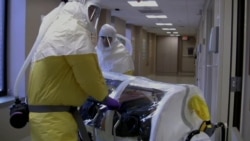American doctors are learning more about treating patients with Ebola - lessons that could improve survival rates.
At Emory University Hospital in Atlanta, which has a special Ebola isolation unit, doctors have discovered key factors in helping those stricken with Ebola beat the odds.
Two American missionaries infected with Ebola were successfully treated at Emory in August after being flown from Liberia in isolation bubbles.
Dr. Jay Varkey, a specialist in infectious diseases at Emory, said comprehensive treatment is the key to beating Ebola.
“What this experience has taught me is that supportive care - one-on-one nursing, availability of labs, monitoring fluids, IV fluids, replenish electrolytes - are really some of the keys to treating Ebola virus,” he said.
Electrolytes are chemicals that regulate our nerve and muscle function, fluid levels, blood pressure, and they are essential in rebuilding damaged tissue.
Varkey said patients at treatment centers in West Africa would do better with more aggressive treatment that replaces electrolytes like potassium, magnesium and calcium, and fluids lost through diarrhea and vomiting.
The two missionaries treated at Emory, Dr. Kent Brantly and Nancy Writebol, received an experimental treatment called Zmapp.
So far, few Ebola patients have received it. And it's hard to say if it works, doctors say.
"Based on all the available data that we've looked at, it is impossible for us to determine whether this drug played a role in improving their symptoms, not doing anything, or even slowing their recovery." Varkey said.
Supples of Zmapp have run out. It will be months before manufacturers have more.
The doctors at Emory have shared their experiences about the role of supportive care with doctors in West Africa and elsewhere.
"Our hope is that, by being able to respond to that supportive care, we will be able to decrease the amount of deaths and devastation that this virus has caused," Varkey said.





